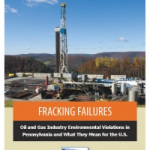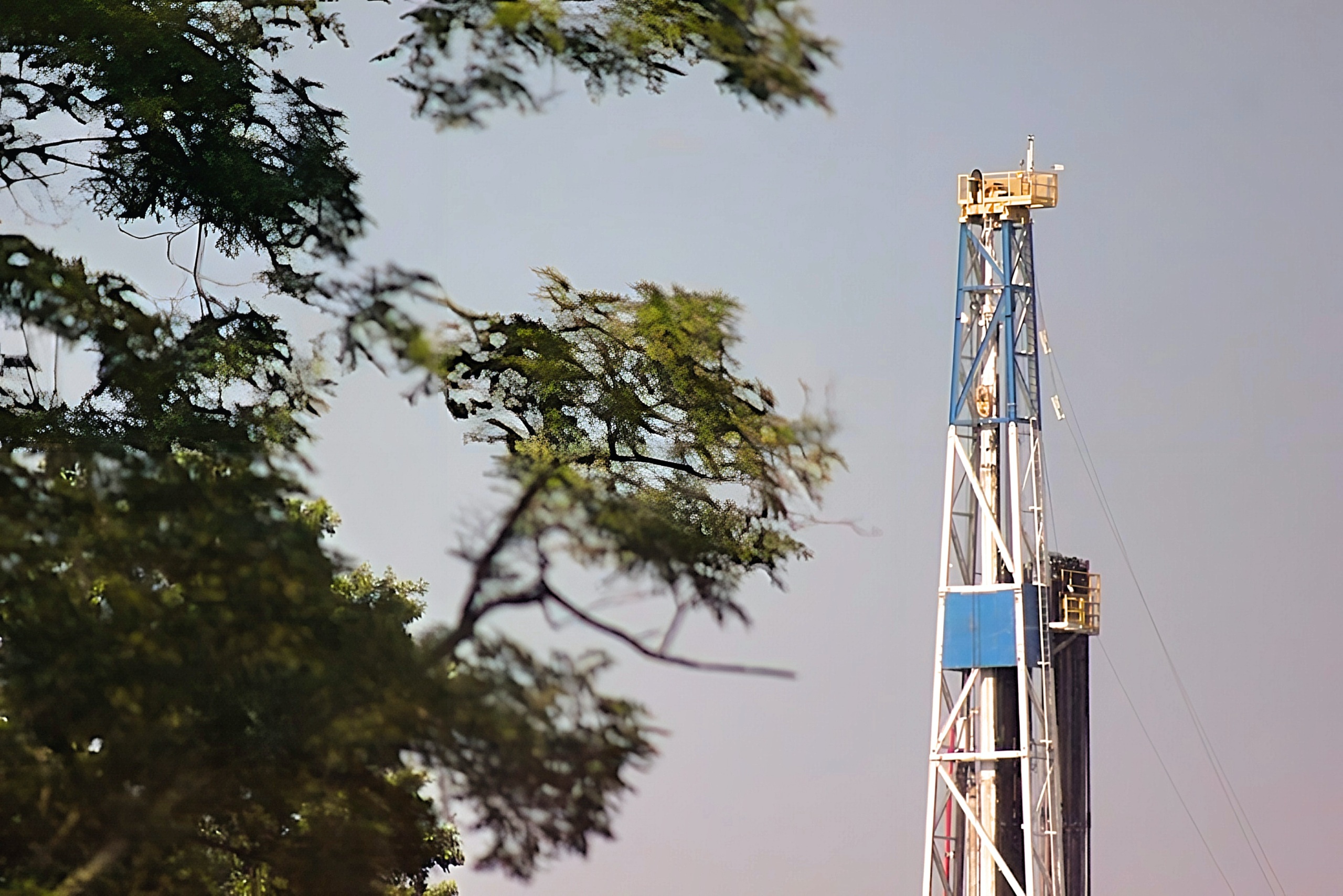
Fracking Failures
Oil and Gas Industry Environmental Violations in Pennsylvania and What They Mean for the U.S.
Fracking is dirty. From the very beginning of clearing a site for drilling, through extraction, transport and delivery of finished products, fracking poses significant risks to our air and water and to human health. People who live and work near fracking sites are at greater risk for respiratory and neurological diseases.
Oil and gas industry spokespeople routinely maintain that the risks of fracking can be minimized by best practices and appropriate state regulation. Not only is this false – fracking is harmful even when drillers follow all the rules – but drillers also regularly violate essential environmental and public health protections, magnifying the risk. A look at recent data from Pennsylvania, where key industry players pledged to clean up their acts, illustrates the frequency with which companies still break the rules.
In Pennsylvania, fracking companies violate rules and regulations meant to protect the environment and human health on virtually a daily basis. Between January 1, 2011, and August 31, 2014, the top 20 offending fracking companies committed an average of 1.5 violations per day.
Fracking operators in Pennsylvania have committed thousands of violations of oil and gas regulations since 2011. These violations are not “paperwork” violations, but lapses that pose serious risks to workers, the environment and public health, including:
Allowing toxic chemicals to flow off drilling sites and into local soil and water. In July 2012, for example, Chief Oil & Gas was cited by the Pennsylvania Department of Environmental Protection (DEP) when the company allowed 4,700 gallons of hydrochloric acid to flow off of its drilling site in Leroy Township, Bradford County, and into nearby Towanda Creek, causing a fish kill.
Endangering drinking water through improper well construction. Well problems, including leaks, contaminated drinking water supplies in as many as 243 cases across Pennsylvania between December 2007 and August 2014 – 81 of them between 2011 and 2014. In one such case Carrizo (Marcellus) LLC was cited for failing to properly restore a water supply its fracking activities had contaminated.
Dumping industrial waste into local waterways. One operator, EQT Production, was cited twice in 2012 by the Pennsylvania Department of Environmental Protection (DEP) for violations at a well in Duncan Township, Tioga County, that polluted a local stream.
Otherwise disposing of waste improperly. In one 2012 incident at an Exco Resources well in Bell Township, Clearfield County, the company was cited for contaminating underground drinking water supplies as a result of leaks from a well drilled for the specific purpose of injecting toxic waste underground.
Downloads
Environment Maryland Research & Policy Center

Fracking is dirty. From the very beginning of clearing a site for drilling, through extraction, transport and delivery of finished products, fracking poses significant risks to our air and water and to human health. People who live and work near fracking sites are at greater risk for respiratory and neurological diseases.
Oil and gas industry spokespeople routinely maintain that the risks of fracking can be minimized by best practices and appropriate state regulation. Not only is this false – fracking is harmful even when drillers follow all the rules – but drillers also regularly violate essential environmental and public health protections, magnifying the risk. A look at recent data from Pennsylvania, where key industry players pledged to clean up their acts, illustrates the frequency with which companies still break the rules.
In Pennsylvania, fracking companies violate rules and regulations meant to protect the environment and human health on virtually a daily basis. Between January 1, 2011, and August 31, 2014, the top 20 offending fracking companies committed an average of 1.5 violations per day.
Fracking operators in Pennsylvania have committed thousands of violations of oil and gas regulations since 2011. These violations are not “paperwork” violations, but lapses that pose serious risks to workers, the environment and public health, including:
- Allowing toxic chemicals to flow off drilling sites and into local soil and water. In July 2012, for example, Chief Oil & Gas was cited by the Pennsylvania Department of Environmental Protection (DEP) when the company allowed 4,700 gallons of hydrochloric acid to flow off of its drilling site in Leroy Township, Bradford County, and into nearby Towanda Creek, causing a fish kill.
- Endangering drinking water through improper well construction. Well problems, including leaks, contaminated drinking water supplies in as many as 243 cases across Pennsylvania between December 2007 and August 2014 – 81 of them between 2011 and 2014. In one such case Carrizo (Marcellus) LLC was cited for failing to properly restore a water supply its fracking activities had contaminated.
- Dumping industrial waste into local waterways. One operator, EQT Production, was cited twice in 2012 by the Pennsylvania Department of Environmental Protection (DEP) for violations at a well in Duncan Township, Tioga County, that polluted a local stream.
- Otherwise disposing of waste improperly. In one 2012 incident at an Exco Resources well in Bell Township, Clearfield County, the company was cited for contaminating underground drinking water supplies as a result of leaks from a well drilled for the specific purpose of injecting toxic waste underground.
The list of top violators in Pennsylvania includes large, multi-national oil and gas industry operators and smaller, locally owned firms – and companies that promised to exceed state safety standards. (See Table ES-1.)
- Subsidiaries of Exxon-Mobil and Shell, along with Cabot and Chesapeake, rank among the top 10 for total violations.
- These and other top violators also have fracking operations or own mineral rights that would allow for future fracking in 23 other states: Alaska, Arkansas, California, Colorado, Illinois, Indiana, Kansas, Kentucky, Louisiana, Maryland, Michigan, Montana, New Mexico, New York, North Dakota, Ohio, Oklahoma, Tennessee, Texas, Utah, Virginia, West Virginia, and Wyoming.
- Pennsylvania-based companies ranking among the top violators included Warren-based Pennsylvania General Energy, Pittsburgh-based EQT Production, Canonsburg-based CNX Gas (a subsidiary of Consol Energy), and Kittanning-based Snyder Bros., Inc.
- Top violators also include the four firms that told the public they would adhere to higher standards when they formed the Center for Sustainable Shale Development in 2013. Since then, those firms – EQT, Chevron Appalachia, Consol and Shell – have together committed at least 100 violations.
Table ES-1. Pennsylvania’s 20 Most Frequently Cited Fracking Companies, Ranked by Number of Environmental and Health Violations, January 2011-August 2014
Company
Environmental and Health Violations
Rank
CABOT OIL & GAS CORP
265
1
CHESAPEAKE APPALACHIA LLC
253
2
RANGE RESOURCES APPALACHIA LLC
174
3
CHIEF OIL & GAS LLC
150
4
SWEPI LP
119
5
XTO ENERGY INC
113
6
ANADARKO E&P ONSHORE LLC
92
7
SOUTHWESTERN ENERGY PROD CO
88
8
WPX ENERGY APPALACHIA LLC
86
9
SENECA RESOURCES CORP
85
10 (tie)
CARRIZO (MARCELLUS) LLC
85
10 (tie)
EXCO RESOURCES PA LLC
82
12
EQT PRODUCTION CO
80
13 (tie)
PA GEN ENERGY CO LLC
80
13 (tie)
TALISMAN ENERGY USA INC
65
15
CHEVRON APPALACHIA LLC
63
16
ULTRA RESOURCES INC
52
17
EOG RESOURCES INC
38
18
CNX GAS CO LLC
36
19
SNYDER BROS INC
31
20
Both large and small firms rank highly for number of violations when adjusted for the size of their fracking activities in Pennsylvania.
- Atlas Resources, based in Pittsburgh, drilled 11 wells between 2011 and August 2014 (among companies with at least five wells drilled), and was cited for 13 violations – or 1.18 violations per well drilled, ranking first. The company was followed by Exco Resources of Dallas; Halcon Operating Company of Houston; Houston-based Carrizo; and Kittanning, Pennsylvania-headquartered Snyder Brothers.
- Mieka, part of Texas-based Vadda Energy, ranked first for the average number of violations per well operated per reporting period (among companies operating at least five wells in at least one reporting period), with 0.46 violations per well per reporting period. The company was followed by Radnor, Pennsylvania-based Penn Virginia Oil and Gas; Enerplus Resources of Calgary, Alberta, Canada; Houston-based Carrizo (Marcellus) LLC; and XTO, a subsidiary of Irving, Texas-based ExxonMobil.
The number of violations that received citations from state officials is, in all likelihood, lower than the actual number of infractions, because of Pennsylvania’s consistent pattern of conducting fewer inspections than state rules require, and because inspectors regularly decline to issue violation notices when companies voluntarily agree to fix problems.
Studies in other states have shown similar problems of violations and environmental damage from fracking. There is little reason to believe, therefore, that fracking operations in Pennsylvania are substantively different from other states in their ability to cause harm or to commit repeated violations of health and safety laws.
The sheer number and severity of risks posed by fracking operations make constructing an adequate regulatory regime – much less enforcing it at thousands of wells and other sites – implausible. Accordingly, we recommend:
- Banning fracking before it begins. As New York Governor Andrew Cuomo has determined, this is the most prudent course for states to protect the environment and public health.
- In states like Pennsylvania where widespread fracking is already under way, a moratorium on all new well permits to limit the damage. For existing wells, states must adopt much more stringent protections and truly enforce them.
- Requiring drillers in states where fracking is already happening to post sufficient financial assurance. Financial assurance rules should be designed to guarantee that the costs of any environmental or public health damage caused by fracking are borne by the drillers, not residents or the public.
- Closing loopholes that exempt fracking from key provisions of our federal environmental laws. Federal policymakers should protect America’s natural heritage by keeping fracking away from our national parks, national forests and sources of drinking water for millions of Americans.
- Collecting and releasing to the public more complete data on fracking. This would enable us to understand the full extent of the harm that fracking causes to our environment and health.
Appendix B: Top 20 Companies Ranked by Environmental and Health Violations, Their Parent Companies, and Their Other Operating Locations[1]
Rank
Company
Environmental and Health Violations, January 2011-August 2014
Corporate Parent
Website
Headquarters Location
States of Operation[2]
1
CABOT OIL & GAS CORP
265
Cabot Oil & Gas Corporation
cabotog.com
Houston, Texas
Pennsylvania, Texas, West Virginia
2
CHESAPEAKE APPALACHIA LLC
253
Chesapeake Energy[3]
chk.com
Oklahoma City, Oklahoma
Colorado, Kansas, Louisiana, Ohio, Oklahoma, Pennsylvania, Texas, West Virginia, Wyoming
3
RANGE RESOURCES APPALACHIA LLC
174
Range Resources
rangeresources.com
Fort Worth, Texas
Kentucky, Maryland, Ohio, Oklahoma, Pennsylvania, Texas, Virginia, West Virginia
4
CHIEF OIL & GAS LLC
150
Chief Oil & Gas LLC
chiefog.com
Dallas, Texas
Pennsylvania
5
SWEPI LP
119
Royal Dutch Shell[4]
shell.com
The Hague, The Netherlands
Louisiana, Ohio, Pennsylvania, Wyoming[5]
6
XTO ENERGY INC
113
ExxonMobil
xtoenergy.com
Irving, Texas
Alaska, Arkansas, Colorado, Kansas, Louisiana, Montana, New Mexico, New York, North Dakota, Ohio, Oklahoma, Pennsylvania, Texas, Utah, West Virginia, Wyoming
7
ANADARKO E&P ONSHORE LLC
92
Anadarko Petroleum
anadarko.com
The Woodlands, Texas
Colorado, Kansas, Louisiana, Pennsylvania, Texas, Utah, Wyoming
8
SOUTHWESTERN ENERGY PROD CO
88
Southwestern Energy
swn.com
Houston, Texas
Arkansas, Colorado, Pennsylvania, Texas, West Virginia
9
WPX ENERGY APPALACHIA LLC
86
WPX Energy
wpxenergy.com
Tulsa, Oklahoma
Colorado, New Mexico, North Dakota
10
SENECA RESOURCES CORP
85
National Fuel Gas Company
natfuel.com
Williamsville, New York
California, New York, Pennsylvania
11
CARRIZO (MARCELLUS) LLC
85
Carrizo Oil & Gas Inc
carrizo.com
Houston, Texas
Colorado, Ohio, Pennsylvania, Texas
12
EXCO RESOURCES PA LLC
82
Exco Resources Inc
excoresources.com
Dallas, Texas
Louisiana, Pennsylvania, Texas, West Virginia
13
EQT PRODUCTION CO
80
EQT Corporation
eqt.com
Pittsburgh, Pennsylvania
Kentucky, Ohio, Pennsylvania, Virginia, West Virginia
14
PA GEN ENERGY CO LLC
80
Pennsylvania General Energy
penngeneralenergy.com
Warren, Pennsylvania
Pennsylvania
15
TALISMAN ENERGY USA INC
65
Talisman Energy Inc
talisman-energy.com
Calgary, Alberta, Canada
New York, Pennsylvania, Texas
16
CHEVRON APPALACHIA LLC
63
Chevron Corporation
chevron.com
San Ramon, California
Michigan, Ohio, Pennsylvania, Texas
17
ULTRA RESOURCES INC
52
Ultra Petroleum Corporation[6]
ultrapetroleum.com
Houston, Texas
Pennsylvania, Wyoming
18
EOG RESOURCES INC
38
EOG Resources Inc
eogresources.com
Houston, Texas
Colorado, Louisiana, Montana, New Mexico, Ohio, Oklahoma, Pennsylvania, Texas, Utah, West Virginia, Wyoming
19
CNX GAS CO LLC
36
Consol Energy
consolenergy.com
Canonsburg, Pennsylvania
Indiana, Illinois, Kentucky, New York, Ohio, Pennsylvania, Tennessee, Virginia, West Virginia
20
SNYDER BROS INC
31
Snyder Brothers Inc
snyderbrothersinc.com
Kittanning, Pennsylvania
Pennsylvania
[1] Environmental and health violations: Pennsylvania Department of Environmental Protection, Office of Oil and Gas Management, Oil and Gas Reports, accessed at www.portal.state.pa.us/portal/server.pt/community/oil_and_gas_reports/20297, 18 September 2014; Unless otherwise noted, all information about a company was accessed at each respective company’s website on 20 October 2014.
[2] “Operation” includes buying up property and mineral rights for prospective future fracking wells.
[3] U.S. Environmental Protection Agency, Energy Company to Pay $3.2 Million Penalty to Resolve Clean Water Violations in West Virginia / Chesapeake Appalachia LLC to Spend Estimated $6.5 Million to Restore Areas Damaged by Natural Gas Extraction (press release), 19 December 2013.
[4] Anya Litvak, “Shell Concentrating its Marcellus Holdings, Sells off Other Shale Assets,” Pittsburgh Post-Gazette, 14 August 2014.
[5] Anya Litvak, “Shell Concentrating its Marcellus Holdings, Sells off Other Shale Assets,” Pittsburgh Post-Gazette, 14 August 2014.
[6] Bloomberg Businessweek, Company Overview of Ultra Resources Inc., accessed at investing.businessweek.com/research/stocks/private/snapshot.asp?privcapId=26654732, 2 October 2014.
Topics
Find Out More


“Certified natural gas” is not a source of clean energy

How you can electrify your home


